Creating Your Easter Nature Table Tutorial
Easter is a holiday that fills me with hope and appreciation for the new life being born and blooming all around me. It is the premier Christian holiday, which recalls the suffering and dying of Jesus Christ on the cross, and his resurrection. It is celebrated the world over by Christians everywhere.
Easter is also a springtime celebration in nature religions, and is considered by scholars to be about three thousand years old. Closely associated with the spring equinox, the goddess Ostara (or Eostar or Eostre) was worshipped by Germanic peoples long before the religion of Jesus swept Europe. The symbols in Christian Easter celebrations are very similar to those symbols of the fertile spring goddesses, who can be found in many ancient cultures. For me, this synchronicity of symbolism among multiple faiths resonates. To me, it highlights the similarities among people everywhere and our universal admiration for the earth and its cycles.
Whatever your religious (or nonreligious) take on this springtime festival, you can create a nature table that calls to mind the bounty of the earth and celebrates abundance, new beginnings, and growth.
My spring maiden graces this spring nature table. Her companions are rabbits and lambs, both symbols of spring’s bounty in the birth of new animals. Rabbits are prolific breeders, so they have long served as a symbol of fertility and abundance, as well as the bringers of colored eggs at Easter. A beautiful meadow, painted by my son in second grade, serves as a backdrop. A green crystal frog at the far end holds a tea light for a nighttime glow. A needle-felted bird sits on a nest in a branch (not pictured).
I love blooming branches, but as I don’t wish to cut any off my trees, I crafted these blooms by hot-gluing white tissue paper blossoms onto bare branches we gathered from the ground. The card showing dancing children is a drawing by my god-daughter. It reminds me of how happy we are to be outdoors again in spring.
Here is a nature table created on our fireplace mantle. We displayed our many needle-felted eggs on upside-down cups and the tops of candle sticks. I framed a print of Persephone, the Greek goddess of the spring and added it. A plant of bleeding hearts provides a living symbol of life, flowers, and freshness. From a long, finger-knitted yarn rope (made by Lucas) and felt egg decorations we made, we created a simple garland. The felt eggs aren’t fancy: They are two-dimensional and made with “craft” acrylic felt and white glue.
Simple and charming. I use these year after year.
A friend of mine found a gnarled piece of wood one day and picked it up. It has the shape of a pregnant woman, with bulbous belly and breasts. My friend gave it to me when I was pregnant and I have kept it as a special object of love and fertility ever since. Perhaps you have some totem that represents the time when you were carrying your babies inside your body, or the time you were waiting eagerly for their arrival in your family. The spring nature table is a perfect place to put such honored objects.
We added some small wooden toys, too: frolicking rabbits and stately geese. These are for curious little hands to touch and enjoy.
For your own nature table, decorate and display Easter eggs of any kind. Blow eggs and hang them from branches to make an Easter tree. Or gather them together in an attractive bowl. Balance colored eggs atop tall candle holders so they may be seen from a distance.
Materials
You most likely won’t have to buy much to create your Easter nature table. Here are some items you probably already have:
- pretty cloth in a spring color
- flowers or grasses from your garden
- fruits or seeds
- decorated eggs (blown eggs will last longer)
- candles or figurines
- watercolor paintings (used as backgrounds or cut into Easter shapes: bunnies, eggs, birds, chicks, flowers)
- any items that symbolize for you fertility, renewal, awakening, abundance, birth, and beauty
- religious items that speak to your family’s traditions or faith
- boxes or bowls
Tutorial
First, clean your nature table. Give the wood a nice polish, if appropriate. Enlist the aid of your children. Be sure to listen to their suggestions about what to add. Now is a great time to sing springtime songs and recite a poem or two. Lay down your cloth on the table and set up any background cloth, picture, or painting you wish to include. This works well for a table that is backed by a wall, but it’s not necessary. I find it’s nice to have several levels if I have space. This can be achieved by using boxes or upside-down bowls underneath your cloth to make hills. Items place on high spots will draw people’s focus. Now arrange your special items however you like. Candlestick holders without candles are a great way to display beautifully decorated Easter eggs. Leave space for additions such as picked flowers that your little ones might contribute throughout the season.
If you have included fresh flowers or fruits or real eggs on your nature table, be sure to check them often and remove and replace them when they wilt or get too old. Your nature table will inspire you if it looks fresh—which is the whole nature of springtime. When it starts to feel old or boring to you, either rearrange it or choose new symbols to display. Keeping your nature table neat and seasonal is a fun, rhythmic way of helping children celebrate festivals and mark the passage of time.
Finally, I wanted to share our family’s Easter tradition. We create an altar outside the night before Easter on a large rock in our backyard. We leave out carrots for the Easter bunny, who personifies for us an Earth spirit, Ostara, or goddess of the spring. In the morning, early on Easter Sunday, we return to our outdoor altar to find the carrots nibbled and fruits and flowers left in their place for us. A basket of small gifts is found there for each of our sons and colored eggs are hidden throughout our yard. As the sun rises over the trees, we greet the new day, hunt for eggs in the dewy grass, and give thanks for the bounty of spring.
* Portions of this article were originally published in the Little Acorn Learning April Enrichment Guide.
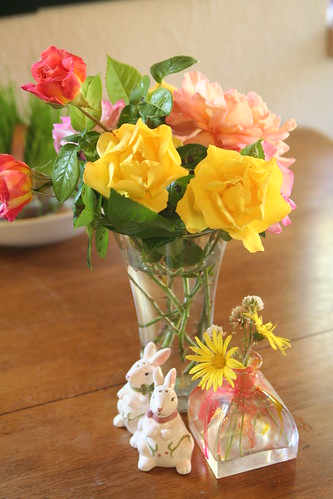

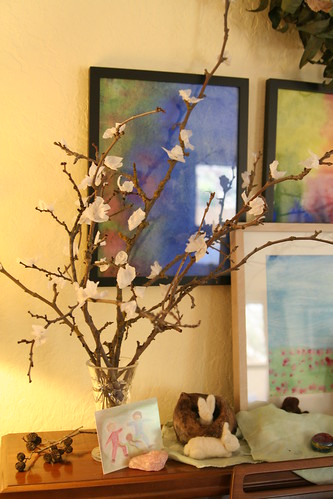
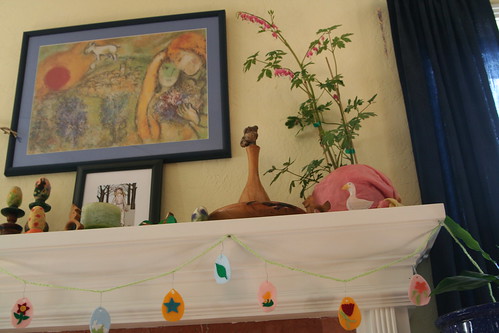
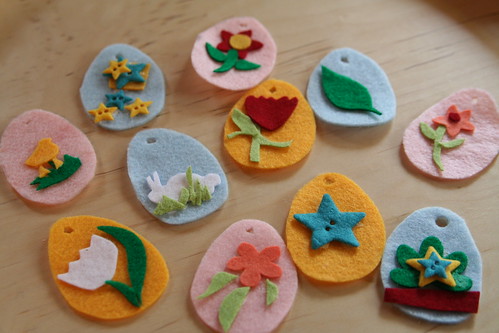
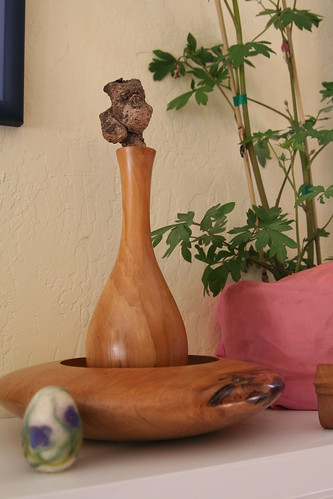
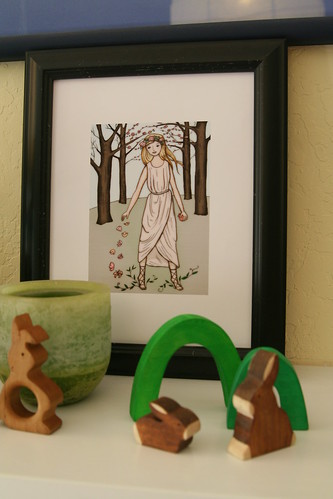
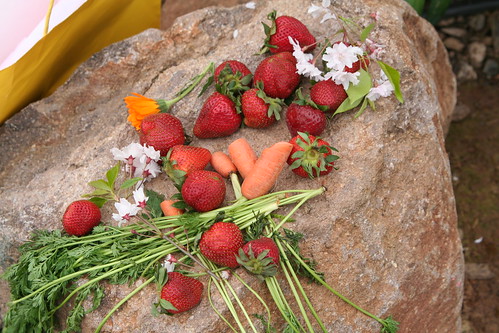
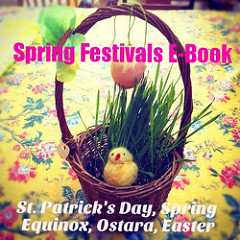
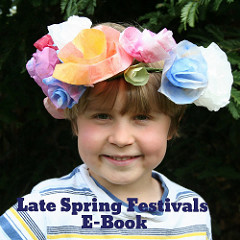

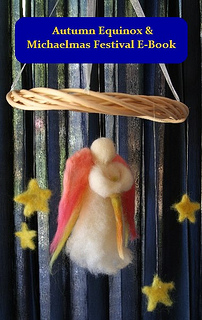
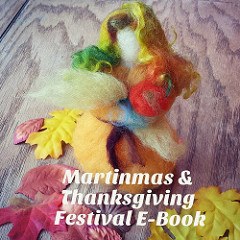
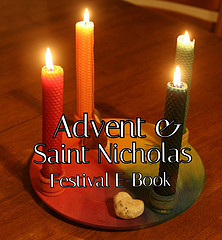
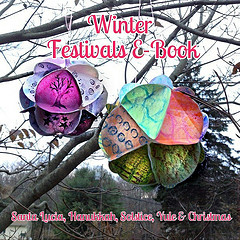

December 12, 2012 at 4:45 pm
Love the picture of the girl scattering petals! Who is the artist?